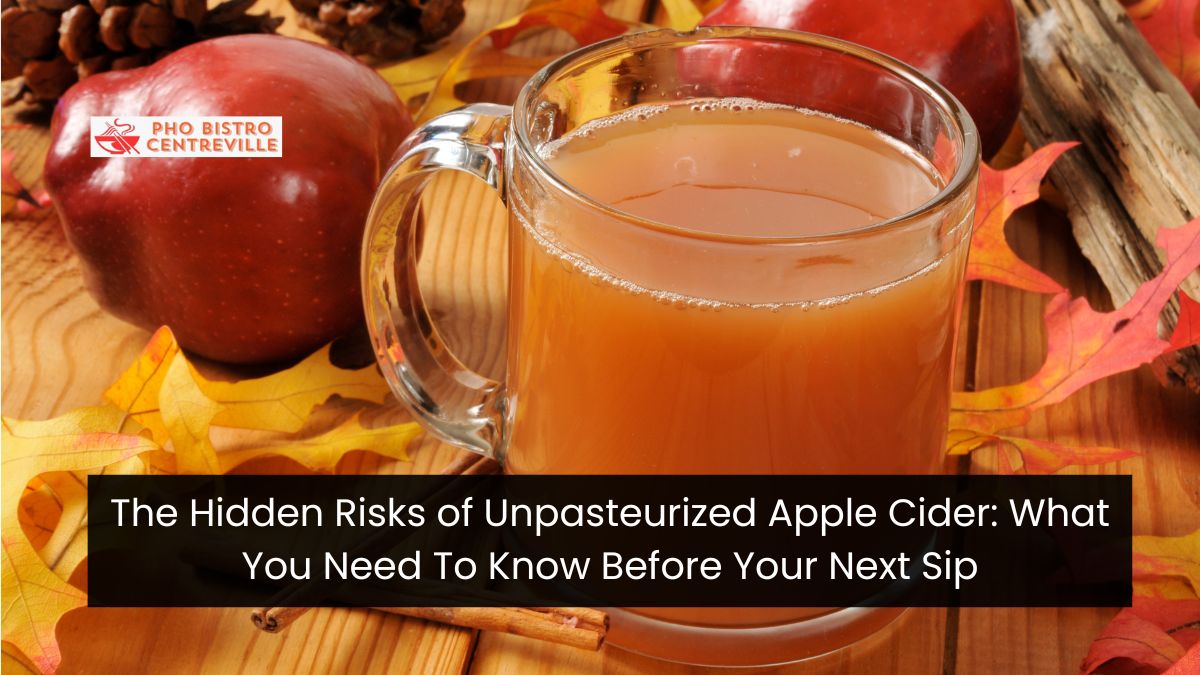As the crisp autumn air sets in and the vibrant fall foliage takes center stage, one drink that comes to mind for many—apple cider. Whether you enjoy it warm or cold, apple cider is a beloved fall tradition.
But before you indulge in that next cup of fresh, unpasteurized apple cider from a local farmers’ market or pumpkin patch, you must know the potential health risks involved.
According to the Food and Drug Administration (FDA), consuming unpasteurized apple cider could have serious health consequences, especially for specific vulnerable populations.
What Is Unpasteurized Apple Cider?
Unpasteurized apple cider is made from fresh-pressed apples without heat treatment, known as pasteurization, which kills harmful bacteria.
While many believe fresh, untreated cider provides a more natural and flavorful taste, it may also carry harmful pathogens like E. coli, Salmonella, and Listeria. These bacteria can be present on the surface of the fruit and can end up in the juice during the pressing process.
Health Risks of Drinking Unpasteurized Apple Cider
Unpasteurized apple cider poses a risk of foodborne illness, particularly for vulnerable populations. According to the FDA, consuming fresh, untreated juices or ciders can lead to dangerous infections.
People with weakened immune systems, such as children, the elderly, pregnant women, and individuals with chronic illnesses like HIV/AIDS, cancer, or diabetes, are at greater risk of serious complications or even death from these illnesses.
Symptoms of a foodborne illness caused by harmful bacteria in unpasteurized cider can include nausea, vomiting, diarrhea, stomach cramps, and fever.
Healthy people may get better from these symptoms without any lasting problems, but people who are more at risk may have worse and longer sickness.
How to Identify Unpasteurized Apple Cider
The FDA has regulations in place to help consumers identify unpasteurized apple cider. Most juices in grocery stores in the United States carry a label specifying whether the product is pasteurized or treated with a non-heat process to destroy harmful bacteria.
However, fresh, untreated cider sold at farmers’ markets, apple orchards, and roadside stands may not be pasteurized and may pose a risk of contamination.
If you’re purchasing unpasteurized apple cider, look for a warning label that states:
CAUTION: This product has not been heated to kill bacteria and may have germs that can make children, older people, and those with weak immune systems very sick
But the FDA does not require this warning label for juice or cider sold by the glass at places like juice bars, restaurants, or stands. Therefore, if you are still determining it’s extremely important to ask if the cider you’re purchasing has been treated.
How to Protect Yourself
While unpasteurized apple cider can be tempting, there are ways to protect yourself & enjoy your favorite fall beverage safely. Here are some essential tips to consider:
- Choose Pasteurized Products: If you can, choose apple cider that has been pasteurized or treated. This is important if you are getting it for kids, seniors, or anyone with a weak immune system. Pasteurization and other treatments get rid of bad bacteria without changing the taste of the cider.
- Know the Source: If you’re purchasing cider from a local farm or farmers’ market, ask if the product has been pasteurized or treated to kill bacteria. Avoid cider that is sold unrefrigerated if it has not been treated.
- Follow Safe Handling Practices at Home: If you’re making your juice or cider at home, ensure that you follow safe food handling practices. Always wash your hands very well if you are going to handle fruits or vegetables, and clean them properly. Bruise or damage any areas of fruits since those are more likely to be contaminated.
- Store and Serve Properly: Always store unpasteurized cider in the refrigerator and consume it within a few days of opening. If cider is left at room temperature, harmful bacteria can multiply quickly.
- Know the Symptoms of Foodborne Illness: Generally, if you have already felt some symptoms of the foodborne illness: stomach cramps, diarrhea, fever; and if you are part of any vulnerable population, consult medical attention after drinking this unpasteurized cider.
Conclusion:
During the fall, many people enjoy apple cider. It’s important to know that unpasteurized cider can be risky. Anyhow, knowing health risks and caution could be the best ways through which a person can enjoy the taste of this fall without getting unwell.
Irrespective of whether you drink pasteurized cider or whether you are cautious about fresh apples handling, being aware would certainly have helped you get through your fall safe and sound.
This season, prioritize safety & enjoy the comforting taste of apple cider with peace of mind.

